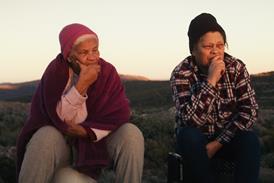With fully-booked studios in Prague, Cold Mountain in Romania, and Hungary and Russia making steps to woo foreign investment, Eastern Europe is becoming an increasingly desirable location.
Foreign filmmaking in Prague is going strong, despite fears of a post-boom hangover following the heady days of 2001, when three US studio shoots maxed out the capacity of the Czech capital. Among a slew of productions this year are Universal Pictures' action comedy Van Helsing, and Revolution Studios and Columbia TriStar's sci-fi thriller Hellboy.
The Czech scene has been the mainstay of period pieces such as Les Miserables, where the streets of Prague stood in for those of 19th-century Paris, or From Hell, where the capital was transformed into 19th century London. But increasingly, studios have capitalised on the area's low costs and high expertise to shoot high budget action thrillers such as New Line Cinema's Blade II, and Sony/Revolution's XXX.
More recently, Fox combined period sets and action sequences for The League of Extraordinary Gentlemen, which recently wrapped in Prague following delays caused, in part, by last summer's flooding.
But many fear that rising costs (fuelled, in part, by a surprisingly strong Czech currency), government indifference to the film industry, and the indefinitely delayed privatisation of Barrandov studios will cast a gloom over the Czech industry - fears compounded when Miramax went further east to Romania last summer to make the US Civil War epic Cold Mountain.
Moreover, the Czech government offers no tax incentives for local shoots with none on the horizon. Insiders here say foreign producers need to begin looking at carefully constructed co-productions to take advantage of incentives offered by other countries. Due to a French-Czech bilateral treaty, for example, a film that shoots in both France and the Czech Republic can qualify for French tax breaks. Italy and Canada have also signed bi-lateral co-production treaties with the Czech Republic.
Although less high-profile than the Czech Republic, Hungary is earning a respectable business servicing visiting international productions. Recent projects include Universal Pictures' Spy Game and Columbia Pictures' I Spy which chose to shoot in Budapest instead of Prague and rewrote the script to fit the Hungarian capital accordingly. Peter Greenaway's Tulse Luper Suitcases trilogy three days shooting in Budapest and used local set and costume designers for the whole shoot.
Russia has lagged behind its eastern European neighbours such as the Czech Republic and Hungary in attracting inward foreign investment, although that may change following its entrance to Eurimages at the start of this year. In addition, a long-established and illustrious domestic film industry has given the country a wealth of experienced crews and sophisticated facilities.
But the cost of accommodation, food and other basics are at least as much if not more than in the Western Europe which rules out any economic benefits.
Productions generally choose to shoot in Russia only if the story demands a Russian location for authenticity. John Daly's adventure thriller, The St Petersburg -Cannes Express, a co-production between the US' Endeavour Productions, and UK's Parallel Films, was one of the few major foreign productions to shoot in Russia since the financial collapse of 1998.
Additional reporting by Blanka Elekes Szentagotai in Budapest and Anna Franklin in Moscow






















No comments yet